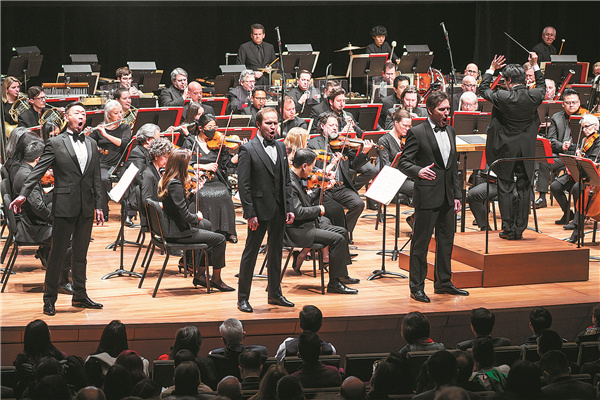

Yet none of this would have been possible without one man — Tian Haojiang, the internationally renowned opera singer who, 11 years ago, founded the iSING! Suzhou International Young Artists Festival, at which the show premiered in late 2020, before considerable changes were made for the world premiere on Saturday. From the idyllic eastern Chinese city of Suzhou, whose misty waters and manicured gardens have inspired more than a few generations of Chinese writers and artists, to New York, the show has come a long way to connect the dynamism of two cultures across time and space, and to demonstrate, in Tian's words, that "the Mandarin language is for Western concert halls".
"Our original mission was very clear: to promote Mandarin as a lyrical language for opera singers. If niche critical languages like Czech and Russian can make it into the operatic mainstream, Mandarin can be known and sung in the wider world — and even included in the curriculum, the way singers study Czech or Russian diction assiduously," says Katherine Chu, dean of the Tianjin Juilliard School, who's also the head coach and music producer of iSING! Suzhou.
Yet there was a problem. "To sing in Mandarin, you need a repertoire, which we quickly exhausted during the early years of iSING!," says Chu, who saw commissioning new works as the only way forward. The concert, titled Echoes Of Ancient Tang Poems, is the result of a long and meticulous process that started in early 2020 when a group of Chinese literary scholars, critics and translators spent two months whittling 200 Tang poems down to a list of 20, which they deemed as the most suitable to be set to music.
What followed was another selection process, which lasted for five months and involved an international panel of judges. They sifted through more than 100 entries, submitted from 18 countries, by composers who served up their own unique musical renditions of, what seemed on the surface, to be something far removed from the cultural upbringing and immediate experiences of many of the candidates.
Or, maybe not, says Evan Mack, the only composer with two scores featured in Saturday's performance. One is for the poem Up On the Crane Tower, whose author Wang Zhihuan, born more than a decade before Li Bai in 688, philosophized about his own tower-climbing with 10 Chinese characters that translate into "To see a thousand miles in the distance, up another flight one goes."
Yet it was the other 10 characters that come before these that gave Mack the entry point. Searching online for images of the Crane Tower — a replica exists in today's Yongji city, Shanxi province — Mack found a visual equivalent to Wang's lines, "The sun gliding down behind the mountain edge, the Yellow River flows seaward", and a familiar one.
"The landscape jumped out at me as it looks very much like where I currently live in the Adirondack in northern New York — I'm surrounded by mountains and rivers and I wake up every morning to a beautiful sunrise," he says. "For me, it's a familiar picture to paint musically."
From there, the composer went on to let Wang's lesson sink in. "Mountain climbing as a metaphor for life's ascendance is something I ascribe to," says Mack, whose answer to that physical and mental uplift would be a crescendo. "My music is constantly climbing. You'll hear in the background the flowing and fluttering of water, and then you'll hear recurring low-to-high notes throughout that whole piece.
"As the singer was singing the text, the orchestra was always striving for him to sing higher," he adds, noting that his piece also contains a serene aspect innate to the original poem. "A life's journey need not be daunting — instead of racing up a hill, one makes steady, stepwise moves."